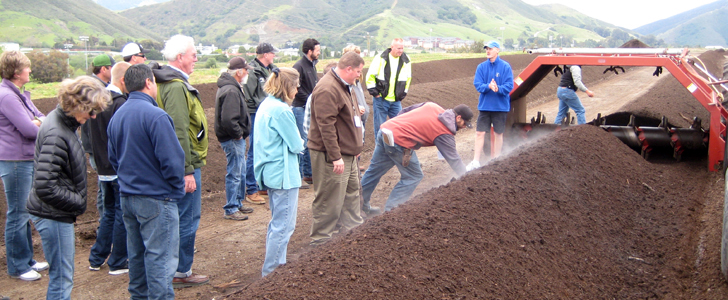Composting

The Cal Poly Compost Unit is one of the nation's largest university composting facilities. It is managed by the Agricultural Operations Department. Utilizing a combination of animal wastes from livestock units and landscape trimmings generated throughout the campus, the Compost Unit produces over 2,000 tons of high-quality compost per year. Cal Poly compost is produced using an aerobic, actively-managed windrow system adjacent to the Cal Poly Organic Farm. Compost produced at Cal Poly has met the high standards of the U.S. Composting Council (USCC) and received its Seal of Testing Assurance (STA). The Compost Unit works to ensure consistent quality by monitoring management practices throughout the composting process through regular testing of parameters such as maturity, carbon:nitrogen ratio, moisture content, common pathogens, temperature and pH. The finished product is used as a soil amendment for campus crops, pastures and landscaping, supplied wholesale to local vineyards and farms, and bagged for sale to the general public at the Poly Plant Shop.
The Center for Sustainability received funding from the USDA's Western Sustainable Agriculture Research and Education (SARE) program in 2011 to establish the Cal Poly Compost Project. The Cal Poly Compost Project was a collaboration between the Center for Sustainability, Agricultural Operations staff, and faculty and students from various departments such as Natural Resources Management and Environmental Sciences, Horticulture and Crop Science, Environmental Engineering, and Biological Sciences with the aim of advancing the scientific and practical understanding of composting processes and enhancing educational opportunities on the topic for campus and community members and agricultural professionals.
Composting is a powerful method for converting plant and animal waste into an ideal soil conditioner. This remarkable transformation results in a valuable agricultural product that can confer numerous benefits to soils such as: nutrition, improved soil structure, water-holding and chemical buffering capacity, and beneficial microbes capable of suppressing pathogens. Composting is also useful in the diversion of organic materials from landfills and is used widely by municipalities in California to improve the sustainability of their communities. Composting at Cal Poly is a key component of the university's zero-waste goals and continues to be a resource for modeling green waste solutions.
Links
Cal Poly:
Cal Poly Certified Organic Compost
Home Composting Brochure
Organizations and Resources:
ATTRA Composting: The Basics
BioCycle Magazine
'What's Your Ideal Composting Recipe?' article by CP Alum Jorge Montezuma
Maine Compost School
People, Food and Land Foundation
Planning for Compost Guide by Calla Rose Ostrander & CP Alum Stephanie Cain
U.S. Composting Council
Resources for Home/Garden Composters:
Composting at Home, tips from the Environmental Protection Agency (EPA)
Grillio's Guide to Food Waste and Composting




